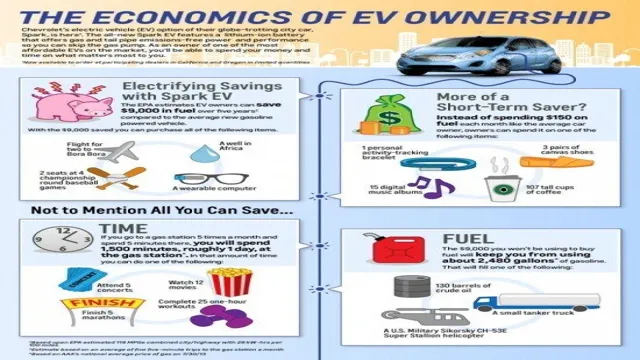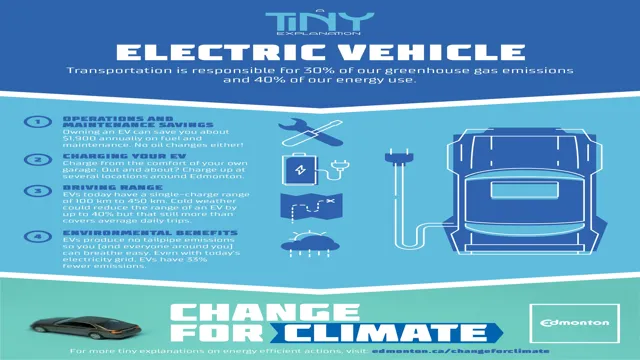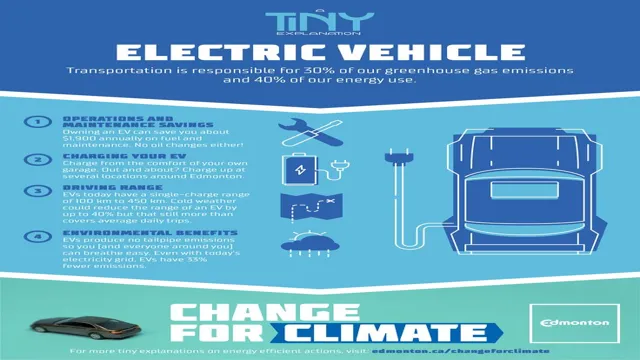Driving towards a greener economy: The undeniable economic benefits of electric cars
Are you tired of paying hefty amounts for gas every month? Did you know that electric cars could be the solution you’ve been looking for? Electric cars, also known as EVs, provide several benefits that go beyond just being environmentally friendly. In this blog post, we will explore the economic benefits of electric cars that make them a smart choice for your wallet. Electric cars come with a higher upfront cost compared to traditional gasoline cars, but the long-term savings they provide more than make up for it.
With energy-efficient technology, EVs can run at a fraction of the cost required for gasoline vehicles. Moreover, electric cars require less maintenance since they have fewer moving parts, which means fewer visits to the mechanic for expensive replacements. You can also benefit from tax credits and incentives that make EVs more affordable.
Driving an electric car also means you can say goodbye to frequent gas station visits, saving both time and money. With lower energy costs, you can take longer road trips without worrying about the amount of money you’re spending on gas. Charging an electric car’s battery is quick and convenient, with many public charging stations available for free or at a lower cost than gas stations.
Finally, owning an electric car comes with resale value benefits. Since EV technology is always improving and becoming more popular, your electric car is likely to hold its value for longer than a traditional gasoline car. This means that when it’s time to sell or trade-in your vehicle, you can receive a higher resale price, further reducing the overall cost of ownership.
In conclusion, electric cars offer several economic benefits that make them a smart choice for drivers looking to save money in the long run. Reduced energy and maintenance costs, tax credits, and incentives, fewer gas station visits, and higher resale value are just some of the reasons why you should consider an electric car in your next vehicle purchase.
Lower Fuel Costs
One of the major economic benefits of electric cars is the significantly lower fuel costs compared to gas-powered vehicles. Electric cars are powered by electricity from the grid, which is significantly cheaper than gasoline. This means that drivers of electric cars can save hundreds or thousands of dollars each year on fuel costs alone.
Additionally, electric cars require less maintenance than gas-powered cars, which further reduces the overall cost of ownership. While the upfront cost of electric cars may be higher than traditional cars, the long-term savings make it a smart financial decision in the end. So, the next time you’re at the gas station, think about how much money you could save by switching to an electric car.
Comparison of Fuel Costs for Gasoline and Electric Cars
When it comes to comparing fuel costs for gasoline and electric cars, it’s clear that electric cars come out on top. While gasoline prices can fluctuate greatly and increase rapidly, electric cars have more stable and lower fuel costs. With an electric car, you can charge up your vehicle at home or at a public charging station for a fraction of the cost of filling up a gasoline car.
Plus, electric cars are more efficient than gasoline cars, meaning they can travel farther on the same amount of energy. So, not only are electric cars better for the environment, but they can also save you a significant amount of money on fuel costs over the long run. If you’re in the market for a new car, it’s worth considering an electric vehicle for the cost savings alone.
Savings on Maintenance Costs
Lower fuel costs can be a significant factor in reducing overall maintenance costs for your vehicle. By opting for a more fuel-efficient car or implementing better driving habits, you can save a significant amount of money on fuel expenses. By doing so, you can also reduce wear and tear on your car’s engine, resulting in lower maintenance and repair costs over time.
It’s important to keep track of your fuel consumption and stay on top of routine maintenance tasks such as oil changes and tire rotations. Failing to maintain your car properly can lead to decreased fuel efficiency and costly repairs down the line. So, take steps to drive efficiently and maintain your car properly, and you can enjoy significant savings on your overall maintenance costs.
Environmental Benefits
Electric cars not only offer great economic benefits for vehicle owners but also play a significant role in promoting a cleaner and greener environment. These vehicles emit less carbon dioxide and other harmful pollutants, reducing air and noise pollution. Moreover, electric vehicles are powered by renewable energy sources like solar or wind, which help to reduce our reliance on fossil fuels.
By reducing harmful emissions, electric cars are helping to mitigate climate change and protecting the environment. Additionally, electric cars are quieter than traditional gasoline-powered vehicles, which results in less noise pollution in urban areas. Overall, the environmental benefits of electric cars are significant and cannot be overlooked, making them an attractive option for environmentally conscious commuters.
Reduced Emissions and Health Costs
One of the most significant benefits of reducing emissions is the positive impact it has on the environment. By producing less carbon dioxide and other harmful pollutants, we can lessen the negative consequences of climate change, such as rising sea levels and extreme weather conditions. Not only that, but reducing emissions can also lead to improved air quality, which ultimately results in better public health.
It’s been shown that reducing air pollution can significantly reduce healthcare costs, as fewer people suffer from respiratory illnesses like asthma, lung cancer, and heart disease. By using cleaner and more sustainable energy sources, we can create a healthier and more livable planet for future generations. It’s up to all of us to take responsible actions towards reducing emissions to ensure a brighter, more sustainable future for ourselves and our planet.
Government Incentives and Tax Credits
Government incentives and tax credits can play a crucial role in encouraging environmentally friendly behavior. By offering financial rewards for sustainable choices, individuals and businesses are more likely to invest in eco-friendly technologies and practices. Not only can these government programs help to reduce pollution and waste, but they also promote long-term financial savings.
For example, homeowners who install solar panels may be eligible for tax credits that offset the initial costs, allowing them to save money on their electricity bills in the long run. Similarly, businesses that invest in energy-efficient technologies may be eligible for tax deductions or rebates, which can help offset the initial investment costs. Overall, government incentives and tax credits provide a win-win situation – helping to protect the environment while also providing financial benefits to those who make sustainable choices.
Global Impact on Fossil Fuel Consumption
The global impact of reduced fossil fuel consumption is evident from the numerous environmental benefits that come with it. One of the most significant advantages is the reduction of greenhouse gas emissions, which ultimately result in climate change. Fewer carbon emissions mean less contribution to global warming, which consequently minimizes extreme weather conditions and natural disasters.
Additionally, less dependency on fossil fuels helps keep our air and water clean while minimizing toxic pollution. Furthermore, renewable energy sources like wind, solar and hydro, which replace fossil fuels, have the added advantage of providing cheaper and more sustainable energy. While the world continues to feel the effects of climate change, reducing our reliance on fossil fuels goes a long way in mitigating its effects.
It’s time to re-evaluate our energy policies and embrace cleaner, renewable sources of energy, for the sake of our environment and future generations.
Long-term Cost Savings
Electric vehicles are not only eco-friendly, but they also offer long-term economic benefits. Firstly, electric cars have lower operating costs compared to conventional vehicles. Electric vehicles require less maintenance such as oil changes, tune-ups and so on.
These costs can add up significantly in traditional cars, whereas electric car owners save money on these regular expenses, allowing for greater investment elsewhere. Secondly, electric vehicles are cheaper to fuel. The cost of charging an electric car is usually lower than the cost of filling up your petrol/diesel car.
With petrol and diesel prices remaining volatile and unpredictable, owning an electric vehicle can reduce your expenditure on fuel and save you a considerable amount over time. Additionally, electric vehicles have a longer lifespan than traditional cars, meaning the owner can delay repairs and vehicle replacement. The economic benefits of electric cars may not be immediately apparent, but over time electric car owners can save thousands of dollars and enjoy a more sustainable lifestyle.
Estimated Costs of Electric Cars vs Gas Cars over Time
When comparing electric cars to gas cars, the long-term cost savings are a major draw for many buyers. While electric cars often have a higher upfront cost, the savings over the life of the vehicle can be substantial. One study found that over a five-year period, the total cost of ownership for an electric car was $8,439 less than a comparable gas car.
This is due in part to lower fuel and maintenance costs for electric cars. However, the cost savings can vary depending on factors such as state incentives, the cost of electricity and gas, and the make and model of the car. Ultimately, if you plan to keep your vehicle for several years, investing in an electric car can be a smart financial decision.
Prospects for Lower Electric Car Prices in the Future
As the demand for electric cars increases, so does the competition among automakers to reduce the overall cost of electric vehicles. While the initial cost of purchasing an electric car may be higher than its gas-powered counterparts, the long-term cost savings can easily justify the investment. For starters, electric cars have fewer moving parts, which means lower maintenance costs.
Additionally, electric cars are more energy-efficient, resulting in lower fuel costs over time. With advancements in battery technology, electric cars will also become more cost-effective, as the price of batteries is expected to drop significantly in the coming years. As more automakers enter the electric vehicle market, we can expect to see greater options at various price ranges, making electric cars more accessible to the general public.
The future looks bright for electric cars and their potential to provide long-term cost savings for drivers.
Closing Thoughts: The Future of Electric Cars
When it comes to the future of electric cars, the economic benefits cannot be ignored. While the initial cost of purchasing an electric car may be higher than traditional gas-powered vehicles, the long-term savings are significant. Not only do electric cars require less maintenance due to fewer moving parts, but they also have lower fuel and energy costs.
Additionally, as more and more countries and cities move towards renewable energy sources such as wind and solar power, the cost of charging an electric vehicle will continue to decrease. Furthermore, the production of electric cars creates job opportunities in the manufacturing and technology sectors, contributing to local and global economic growth. As consumers become more environmentally conscious and seek out sustainable transportation options, electric cars will undoubtedly become a more appealing and economically advantageous choice.
Conclusion
In conclusion, the economic benefits of electric cars are shockingly electrifying. Not only do they reduce our dependence on fossil fuels and promote a greener future, they also save money on maintenance and fuel costs, and create new job opportunities in the growing electric vehicle industry. So if you want to drive towards a smarter, cleaner, and more prosperous tomorrow, go ahead and plug into the electric car revolution!”
FAQs
What are the economic benefits of owning an electric car?
Electric cars offer significant cost savings over traditional gas-powered cars in terms of fuel and maintenance costs. They also qualify for various incentives such as tax credits, reduced tolls, and free parking.
Are electric cars more expensive than traditional cars?
While some electric cars may have a higher sticker price, the overall cost of ownership is much lower due to the lower cost of fuel and maintenance. Additionally, there are various incentives available that can reduce the cost of purchasing an electric car.
How do electric cars contribute to the economy?
The emerging electric vehicle industry provides new job opportunities in manufacturing, research and development, and infrastructure. Additionally, the growth of electric vehicles can stimulate local economies by reducing the amount of money spent on imported oil.
What is the environmental impact of electric cars on the economy?
By reducing greenhouse gas emissions, electric vehicles can help reduce the negative economic impacts of climate change such as the costs associated with rising sea levels, natural disasters, and health expenses related to air pollution. In the long term, this can lead to a healthier and more resilient economy.




